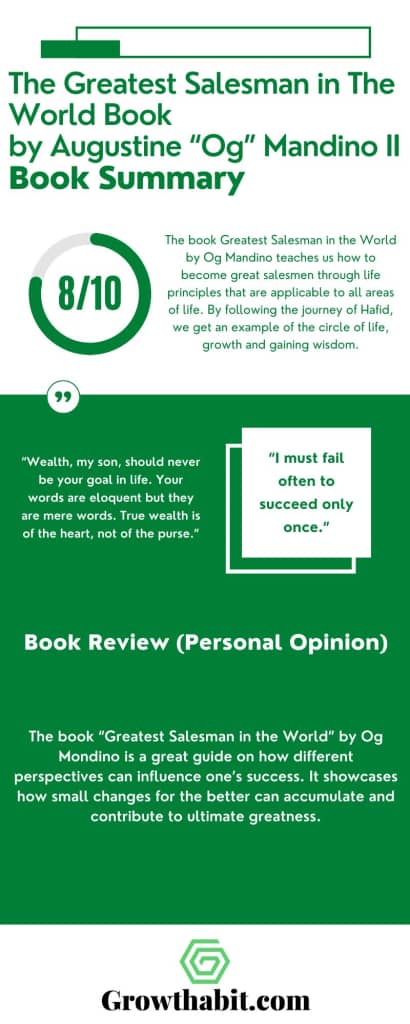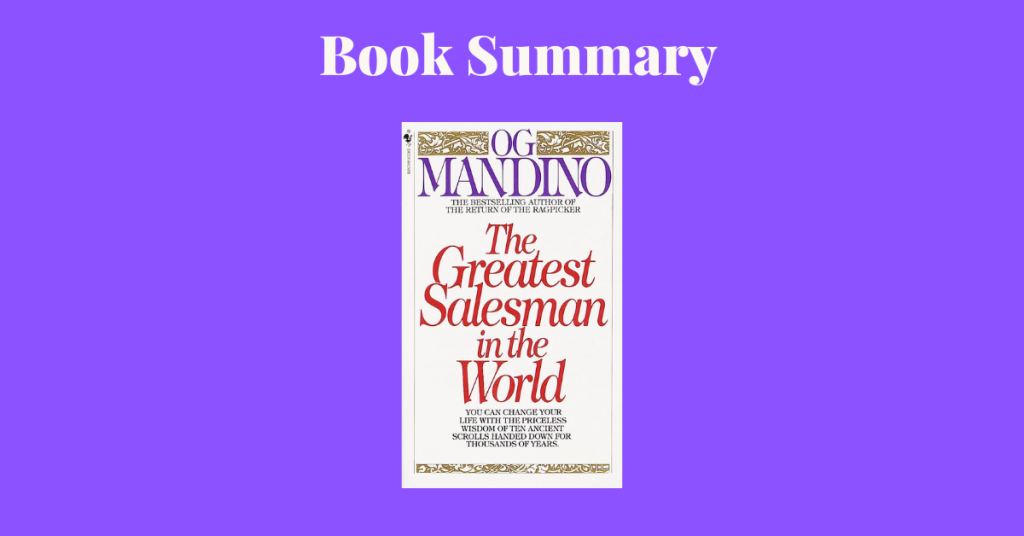The book Greatest Salesman in the World by Og Mandino teaches us how to become great salesmen through life principles that are applicable to all areas of life. By following the journey of Hafid, we get an example of the circle of life, growth and gaining wisdom.
Book Title — The Greatest Salesman in The World
Author— Augustine “Og” Mandino II
Date of Reading— June 2023
Rating— 8/10
What Is Being Said in Detail
Chapter One
The book begins by introducing us to Hafid. At this point, Hafid is a wealthy old salesman. He has a luxurious home, and many people work for him, such as Erasmus. Erasmus is Hafid’s bookkeeper.
On the given day, Hafid requested they meet in a rather unusual place – near the loading platforms. Erasmus was worried and felt something strange was happening. He was right.
Erasmus estimated Hafid’s wealth and possessions to be ten million gold talents, and Hafid requested all of his wealth be turned into gold.
Since his wife, Lisha, passed away, he doesn’t have many needs and wishes to distribute all of his wealth to the poor of the city. He will only keep enough to complete his life without discomfort.
Erasmus was confused by his master’s request but didn’t question it. Due to his loyalty to Hafid over the years, Hafid ordered he transfers fifty thousand gold talents to himself. Hafid stated that he had been his most loyal friend over the years and would share his biggest secret with him.
Chapter Two
Hafid’s wealth was spread how he intended it to, and it was time he shared his biggest secret with his friend Erasmus. He took him to his tower, of which the contents were always hidden. No one had been allowed admission to this room for over three decades.
Erasmus was thrilled yet confused when he saw nothing but an old box inside the tower room. In fact, there had been many rumors of this room and its possessions, but no one had expected it to contain only a chest. Inside, there was nothing but leather scrolls.
Hafid explained to his friend: Were this room filled to its beams with diamonds, its value could not surpass what your eyes behold in this simple wooden box.
All the success, happiness, love, peace of mind, and wealth that I have enjoyed are directly traceable to what is contained in these few scrolls.
My debt to them and to the wise one who entrusted them to my care can never be repaid. This was the secret he kept for so long. He proceeded with an explanation.
Each but one of the scrolls contain a principle, a fundamental truth written in a unique style. To become the master of sales, one must learn and practice the secret of each scroll.
The last scroll is the first one to be read since each is numbered to be read in a particular sequence. One must practice each principle until each becomes a habit in living.
Hafid explained to Erasmus that he still waits for the one who will inherit this knowledge and then asked him to stay by his side until he does. Erasmus agreed.
Chapter Three
Chapter three takes us back to Hafid’s youth and his beginning as a salesman. Hafid was a camel boy for a great salesman named Pathros. Pathros of Palmyra was the most successful salesman of his time.
After working for him for some time, Hafid took the courage to ask him to teach him his skills so he, too, could become a great salesman.
Pathros was surprised to hear this, but everything became clear to him after he understood Hafid’s motives – to marry Lisha, a daughter of a rich man who would never let her marry a camel boy.
Pathros explained to Hafid how wealth should never be his goal in life. Instead, he should strive for happiness, love, and, most importantly – peace of mind and serenity.
He agreed to help as we warned him: Whatever aid I give thee will be a grain of sand compared to the mountains you must move for yourself.
Rewards of success are only great because so few succeed. Staying persistent through all struggles and defeats is important as they build character and force one to improve.
Temptations to quit or strain from the write path are everywhere – how we meet these temptations will greatly affect our careers.
As a first quest and test Hafid must pass to learn from Pathros is to sell a robe in Bethlehem. Bethlehem was usually a hard place to sell goods, but Hafid had only one robe.
Hafid went with the words from his master: Failure will never overtake me if my determination to succeed is strong enough.
Chapter Four
After three days in Bethlehem, Hafid could still not sell the robe as his first quest. His mind was overwhelmed with doubts.
Hafid questioned his approach, the reactions and responses he got, and the more he thought, the more he was losing hope of being with his beloved Lisha. However, thoughts of her gave him the strength to bring back his strength as he hoped the next day would be a success.
Hafid decided to stay in a cave the following night rather than in the noisy city. With thoughts of his master selling hundreds of given robes at the same place many years ago, he wondered where he was wrong.
While rethinking his trip to Bethlehem, a strange noise from the cave surprised him. It was a family who obviously lived there. They seemed cold, and the baby didn’t have many clothes on.
Everyone remained quiet. Hafid felt sorry for the family and knew there was only one right thing to do. He took his robe and covered the baby with it before leaving. As Hafid exited the cave, he noticed the brightest star he had ever seen.
Chapter Five
As Hafid traveled back to Pathros and his caravan, he wondered what had made him do such an act. Why did he give away his precious robe? What would he say to Pathros to explain this? As he approached the caravan, he saw Pathros outside, staring into the heavens.
Pathros was fascinated. “Are you not alarmed that a star should follow you?” he asked Hafid. Hafid responded that he was unaware of such a thing. The star followed him all the way from Bethlehem.
With a heavy heart, Hafid proceeded to explain to his master what had happened. He told him his whole experience of rejection and ignorance he had received from people.
Pathros listened carefully to him. He asked Hafid what his motive was to keep going whenever someone rejected him, to which Hafid responded was the daughter of Calneh.
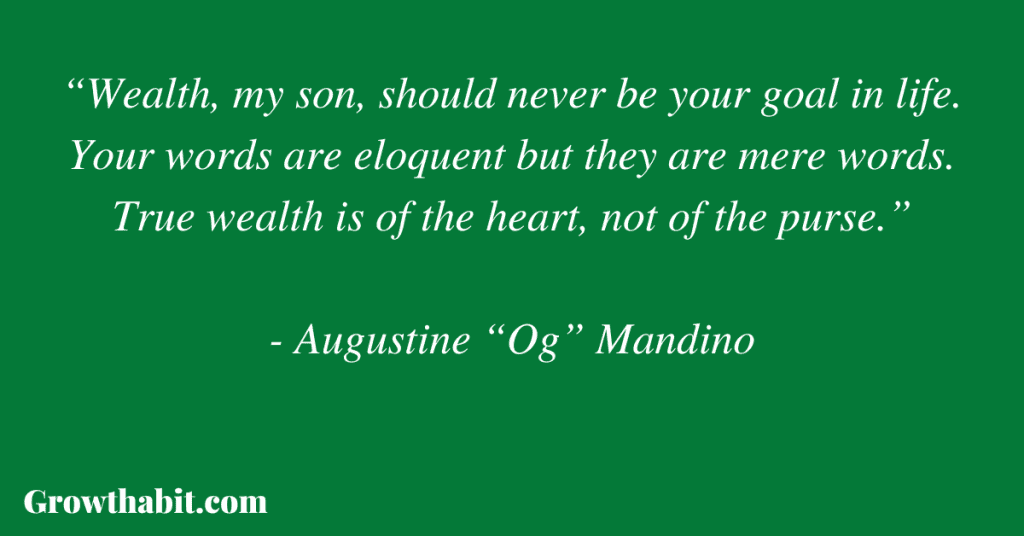
Finally, Hafid explained that he doesn’t have the robe, not because he sold it, but because he gave it to a needy family. Pathros stated that this situation certainly didn’t profit Hafid. Still, it did profit him as it opened his eyes in a way he would explain to Hafid tomorrow.
“Sleep in peace, for you have not failed.”, Pathros stated as Hafid left his tent.
Chapter Six
Twelve days have passed, and Patheos’s condition has changed unexpectedly. He fell ill and could not leave his bed. As Hafid sat on the edge of his bed, Pathros asked him if his ambition was still to become a great salesman. The answer remained positive.
Many years ago, Pathros possessed less status than a camel boy. He was living a humble life. Once, he saved a traveler from two bandits on the road, and as a gratitude, this stranger insisted Pathros would come to his home with him.
This traveler introduced Pathros to his chest, containing 10 letter scrolls, each one numbered. The first contained the secret of learning. The others had all the secrets and principles necessary to succeed in selling.
Pathros was chosen to receive these scrolls, as only one person was allowed to inherit this knowledge.
After Pathros saw the bright star above Hafid as he returned to the caravan, he knew he was the one to inherit the knowledge he got.
With his final strength, he told Hafid how he should approach the knowledge destined for him. He gave him three conditions:
- My first condition is that you must swear under oath that you will follow the instructions contained in the scroll marked One.
- My second condition is that you must constantly dispose of half your earnings to those less fortunate than you. There must be no deviation from this condition.
- And now, the most important condition of all. You are forbidden to share the scrolls or the wisdom they contain with anyone. One day a person will appear who will transmit to you a sign just as the star and your unselfish actions were the sign I sought.
At last, Pathros told Hafid to take the chest with the scrolls with him and depart, wishing him all the luck with marrying his beloved Lisha.
“Failure will never overtake me if my determination to succeed is strong enough?”, Hafid asked. Pathros smiled faintly and nodded as he raised his hand in farewell.
Chapter Seven
Arriving in Damascus, Hafid was overwhelmed by all the street merchants rushing at him from all sides, holding up merchandise, each screaming louder than the next.
He arrived in his clean room and prepared mentally for what awaited him. Firstly, he needed to absorb the knowledge from the scrolls. What he saw in Damascus so far frightened him. He doubted how he would, a camel boy, outperform all the salesmen he witnessed.
As he woke up the following morning, Hafid saw a bird in his room. The lattice on the windows didn’t have enough space for the bird to go through.
Amazed by this, he remembered the voice of Pathros and repeated the words aloud, “Failure will never overtake you if your determination to succeed is strong enough.” He took the Scroll Marked I. He began to read…
Chapter Eight – The Scroll Marked I
Scroll marked one was the introduction of what was to come. It focuses on new habits and encourages the reader to form them as they will the reader to become the best version of themselves.
The scroll emphasizes the importance of persistence through gaining good habits and eliminating bad ones.
The Scroll Marked I contain instructions for taking in the knowledge of each scroll. The reader must read the words of the scroll in silence when they arise.
Then, the reader should read them in silence after the midday meal. Last, the reader should read them aloud just before the day’s end.
The reader needs to maintain positive energy every day as it contributes to its final goal. Discipline and memorization of the contents of the scroll are the commitment the reader must make. The power of positive energy and determination are key to this scroll.
Chapter Nine – The Scroll Marked II
The Scroll Marked Two is about love. The reader should take love towards the world and himself as love is the greatest weapon one may possess.
Every day shall be greeted with love from one’s heart, which means the reader shall see potential and good in everyone rather than their faults and weaknesses.
Out of all things, the reader shall love themself, as in that way he shall inspect all things that enter his body, mind, soul, and heart. Non-selfishness is key for one to embrace the qualities and others with heart.
Never should one allow their heart to become small and bitter; rather, they should share their heart, which will grow and warm the earth.
The reader shall greet the day with love, and they will succeed.
Chapter Ten – The Scroll Marked III
The Scroll Marked III focuses on persistence and perseverance. The key to success is never giving up since one must often fail to succeed only once. The Scroll Marked III teaches the reader to not complain and not listen to those who weep and complain, for their disease is contagious.
The words such as quit, cannot, unable, impossible, failure, and hopeless shall be removed from one’s vocabulary as they are the words of fools.
“I will persist until I succeed” is the mantra of The Scroll Marked Three. It teaches the reader that great success comes from trying hard and persisting through every hardship as a solution awaits…
Chapter Eleven – The Scroll Marked IV
“I am nature’s greatest miracle.” The Scroll Marked IV emphasizes how the reader has unique skills that no one can duplicate. Since the beginning, every individual has been unique, with special traits natural only to them. The reader should apply this to the goods they sell.
None can duplicate my brush strokes, none can make my chisel marks, none can duplicate my handwriting, none can produce my child, and, in truth, none can sell exactly as I. Henceforth, I will capitalize on this difference, for it is an asset to be promoted to the fullest.
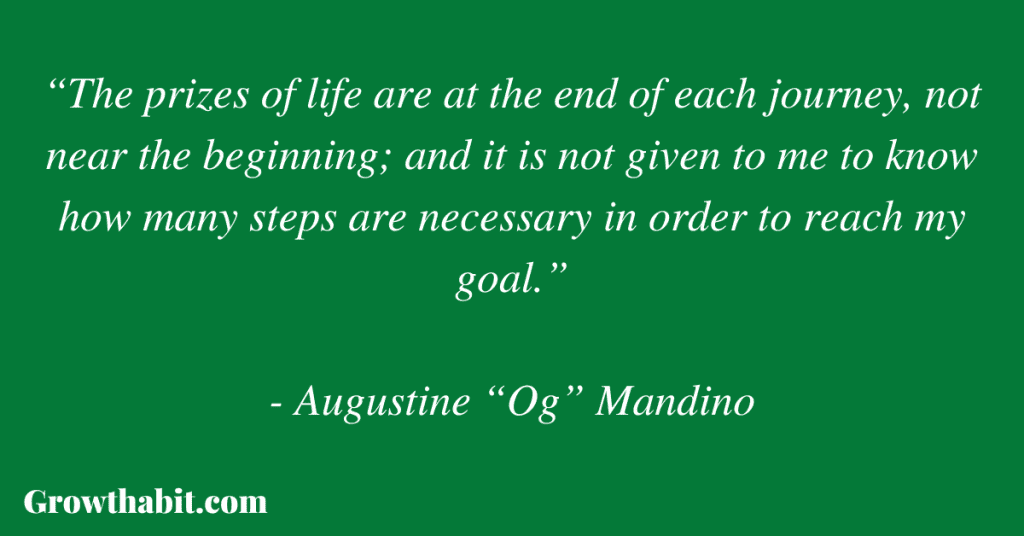
Nevers should one be satisfied with yesterday’s accomplishment, nor should they indulge in self-praise deeds. One can accomplish more than they have, as one will try harder each day to become a better salesman.
Concentrating on becoming better and growing is the step ahead of fulfilling one’s purpose. The reader shall become a great salesman, as they are unique.
The Scroll Marked VI focuses on building confidence by recognizing and embracing one’s potential while developing humility and gratitude.
Chapter Twelve – The Scroll Marked V
The mantra of The Scroll Marked V is “I will live this day as if it is my last.”
Through Scroll Marked V, the reader learns that time is precious, so one should live every day like there was no yesterday nor there is tomorrow. One should not think of yesterday’s accomplishments or failures, as they can misguide their way of thinking about themselves.
This scroll teaches us to embrace each day and live it to the fullest, as time wasted is time destroyed. Thus, one should avoid the killers of time, such as procrastination, doubt, and fear. The duties of the given day shall be fulfilled on that day.
“I will live this day as if it is my last.
And if it is not, I shall fall to my knees and give thanks”.
Chapter Thirteen – The Scroll Marked VI
“Today, I will be master of my emotions.”
The Scroll Marked VI highlights the importance of controlling emotions. Everything in nature has cycles, as do emotions – yesterday’s joy will become today’s sadness. Yet, today’s sadness will grow into tomorrow’s joy.
As a salesman, one should not show their customers negative emotions, as they will react the same way to their purchase. “Weak is he who permits his thoughts to control his actions; strong is he who forces his actions to control his thoughts.”
Each negative emotion should be fought with a positive act – sadness with laughter, illness with labor, etc. One should be able to recognize their emotions, as well as the emotions of others, but also that others probably don’t know how to recognize and control them.
Therefore, one should not judge a man based on one meeting, as all people have their cycles, just like nature does.
Today I will be a master of my emotions.
Chapter Fourteen – The Scroll Marked VII
I will laugh at the world.
The Scroll Marked VII focuses on positivity and its importance in everyday life. This scroll encourages the reader to approach every day with a lighthearted perspective, not taking things too seriously. As challenges and setbacks are a part of life, laughter is their resilience.
This scroll suggests laughter can ease everyday hardships, help with maintaining a positive attitude, improve relationships, and increase overall happiness.
The scroll also highlights that one should never forget to be in the state of mind to laugh at themselves. In that matter, one remains a child as long as one gets the opportunity to look up to others.
Laughter has the power to transform challenges into opportunities and bring light spirit into one’s journey.
Chapter Fifteen – The Scroll Marked VIII
Today I will multiply my value a hundredfold.
The Scroll Marked VIII teaches the reader that continuous efforts turn into big results. Therefore, one must be wise when choosing where to invest themselves.
Firstly, one should set goals for the day, the week, the month, and their life. With those objectives, it will be easier to crystallize the given life.
Therefore, one should not worry that their goals are too high, for it is better to aim at the moon and strike the eagle rather than aim for the eagle and strike a rock.
This scroll highlights the value of aspiring for bigger things and using discipline, a strong work ethic, and persistence on the way.
Chapter Sixteen – The Scroll Marked IX
I will act now.
The Scroll Marked IX highlights the power of acting now and not waiting for the perfect moment or for delaying our tasks. One should embrace given opportunities rather than waste them, as that is the key to success.
Only actions have the power to multiply one’s value, so they should be taken seriously.
One should stop dwelling on past mistakes and stop worrying about what is about to come. Instead, it is important to focus on what is happening and what one can achieve today.
Chapter Seventeen – The Scroll Marked X
The Scroll Marked X is the final scroll, and it focuses on the importance of praying and being guided in life by faith. Everything around us suggests we need faith, so why should we go and avoid it?
This Scroll encourages the reader to seek belief in something above themselves to get a sense of serving a higher purpose.
One’s humility and search for a divine purpose can be the main road to wisdom and clarity. With gratitude and appreciation for people and events in one’s life, prayer, faith, and surrender, one can overcome obstacles and achieve the highest potential.
Chapter Eighteen
Three years passed, and Hafid was still waiting for the next greatest salesman to appear. One day, there was someone at his door. A young man did not seem to be in the best condition.
Erasmus opened the door for him, and he kindly requested to meet with Erasmus’s master – Hafid, for he had heard he was the best salesman in the world.
Erasmus was hesitant but left the man in. Both of them joined Hafid in the garden. The young man introduced himself as Paul and came to ask for guidance and help from Hafid.
Firstly, he wanted to share his story with Hafid. The young man has come from Jerusalem, where he witnessed a death sentence for a man blamed for blasphemy against their God.
The man who witnessed death was called Stephen and was a follower of a man named Jesus, who was crucified several years ago by the Romans.
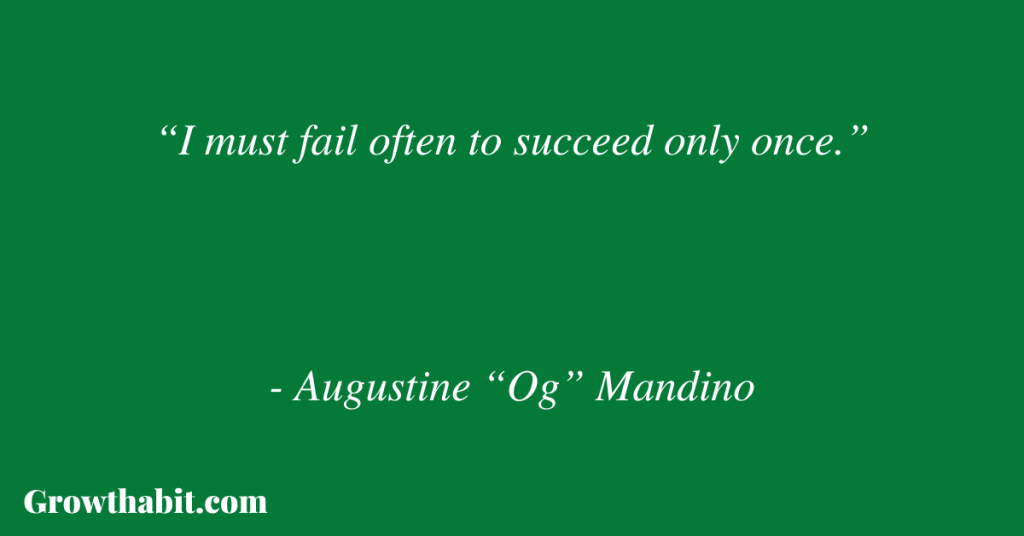
Paul was first on the mission of journeying to Damascus to search for every follower of Jesus and return them in chains to Jerusalem for punishment. That was four years before.
Erasmus and Hafid were surprised by what they were hearing. Silence in the garden was unquestionable.
Paul continued. When he approached Damascus years ago, a sudden flash of lightning hit. He found himself on the ground, unable to see anymore. He heard Jesus’s voice, which told him he would be told what to do when he entered Damascus.
Paul spent the following days with a follower of Jesus, and after some time had passed, he got his vision back into the hands of another follower.
After trying to convince people to follow Jesus, he got advice on how to do it better – even the word of God must be sold to people, or they will not hear it. Paul was told to return to Damascus to find the one everyone calls the greatest salesman in the world in order for him to show Paul the way.
Hafid was intrigued but not yet convinced. He asked Paul to tell him more about Jesus. Paul took a red robe from his bag and gave it to Hafid. On the robe was the sign of Pathros.
Then he told him how Jesus was born in a cave in Bethlehem. “And was there not the brightest star that man has ever seen which shone above the birthplace of this baby?”
Paul was in shock, and the two men hugged each other. Hafid turned to Erasmus and told him that the time had come for him to bring him the chest with the scrolls.
Most Important Keywords, Sentences, Quotes
Chapter One
/
Chapter Two
/
Chapter Three
“Wealth, my son, should never be your goal in life. Your words are eloquent but they are mere words. True wealth is of the heart, not of the purse.”
“Do not aspire for wealth and labor not only to be rich. Strive instead for happiness, to be loved and to love, and most important, to acquire peace of mind and serenity.”
“The rewards are great only because so few succeed. Many succumb to despair and fail without realizing that they already possess all the tools needed to acquire great wealth.”
“Obstacles are necessary for success because in selling, as in all careers of importance, victory comes only after many struggles and countless defeats.”
“Never feel shame for trying and failing for he who has never failed is he who has never tried.”
“Failure will never overtake me if my determination to succeed is strong enough.”
Chapter Four
/
Chapter Five
“Although I consider myself a good salesman, I am unable to sell death on departing from my door.”
Chapter Six
/
Chapter Seven
/
Chapter Eight – The Scroll Marked I
“Just as nature made no provision for my body to tolerate pain neither has it made any provision for my life to suffer failure.”
“I will commence my journey unencumbered with either the weight of unnecessary knowledge or the handicap of meaningless experience.”
“In truth, the only difference between those who have failed and those who have succeeded lies in the difference of their habits.”
Chapter Nine – The Scroll Marked II
“I will love all manners of men for each has qualities to be admired even though they be hidden. With love I will tear down the wall of suspicion and hate which they have built round their hearts and in its place will I build bridges so that my love may enter their souls”
Chapter Ten – The Scroll Marked III
“I will hear not those who weep and complain, for their disease is contagious.”
“The prizes of life are at the end of each journey, not near the beginning; and it is not given to me to know how many steps are necessary in order to reach my goal.”
“I will never consider defeat and I will remove from my vocabulary such words and phrases as quit, cannot, unable, impossible, out of the question, improbable, failure, unworkable, hopeless, and retreat; for they are the words of fools.”
“I must fail often to succeed only once.”
Chapter Eleven – The Scroll Marked IV
“Since the beginning of time never has there been another with my mind, my heart, my eyes, my ears, my hands, my hair, my mouth.”
“Nevermore will I be satisfied with yesterday’s accomplishments nor will I indulge, anymore, in self-praise for deeds which in reality are too small to even acknowledge.”
Chapter Twelve – The Scroll Marked V
“I have but one life and life is naught but a measurement of time. When I waste one I destroy the other.”
“I will avoid with fury the killers of time. Procrastination I will destroy with action; doubt I will bury under faith; fear I will dismember with confidence.”
Chapter Thirteen – The Scroll Marked VI
“The sun rises; the sun sets. The moon is full; the moon is black. The birds arrive; the birds depart. Flowers bloom; flowers fade. Seeds are sown; harvests are reaped. All nature is a circle of moods and I am a part of nature and so, like the tides, my moods will rise; my moods will fall.”
“Weak is he who permits his thoughts to control his actions; strong is he who forces his actions to control his thoughts.”
Chapter Fourteen – The Scroll Marked VII
“Trees may bleed when they are wounded, and beasts in the field will cry in pain and hunger, yet only I have the gift of laughter and it is mine to use whenever I choose.”
“Why should I permit the petty happenings of today to disturb me? What can take place before this sun sets which will not seem insignificant in the river of centuries?”
“Never will I allow myself to become so important, so wise, so dignified, so powerful, that I forget how to laugh at myself and my world.”
Chapter Fifteen – The Scroll Marked VIII
“If it is possible for leaves and clay and wood and hair to have their value multiplied a hundred, yea a thousandfold by man, cannot I do the same with the clay which bears my name?”
“The wheat cannot choose whether it be fed to swine, ground for bread, or planted to multiply. I have a choice and I will not let my life be fed to swine nor will I let it be ground under the rocks of failure and despair to be broken open and devoured by the will of others.”

“Never will I be of concern that my goals are too high for is it not better to aim my spear at the moon and strike only an eagle than to aim my spear at the eagle and strike only a rock?”
Chapter Sixteen – The Scroll Marked IX
“I will not avoid the tasks of today and charge them to tomorrow for I know that tomorrow never comes.”
“For now is all I have. Tomorrow is the day reserved for the labor of the lazy.”
Chapter Seventeen – The Scroll Marked X
“The guidance I seek may come, or the guidance I seek may not come, but are not both of these an answer?”
“Never will I pray for the material things of the world. I am not calling to a servant to bring me food. I am not ordering an innkeeper to provide me with room.
Never will I seek delivery of gold, love, good health, petty victories, fame, success, or happiness. Only for guidance will I pray, that I may be shown the way to acquire these things, and my prayer will always be answered.”
Chapter Eighteen
“Even the word of God must be sold to the people or they will hear it not.”
Book Review (Personal Opinion):
The book “Greatest Salesman in the World” by Og Mondino is a great guide on how different perspectives can influence one’s success. It showcases how small changes for the better can accumulate and contribute to ultimate greatness.
Rating: 8/10
This Book Is For:
- Salesmen
- People who want to learn more about building habits
- Philosophy enthusiasts
If You Want to Learn More
Here’s Og Mandino talking about secrets to success:
Greatest Secrets of Success Og Mandino
How I’ve Implemented the Ideas from The Book
Self-reflection: As I’ve read the book and agreed with the points it made, I’ve started to reflect on all of my roles in life and if they correlate to the points I want them to.
One Small Actionable Step You Can Do
One small actional step you can do is to reflect on yourself and your influence on others. Being self-aware is a step in understanding where you are and where you need to be.
